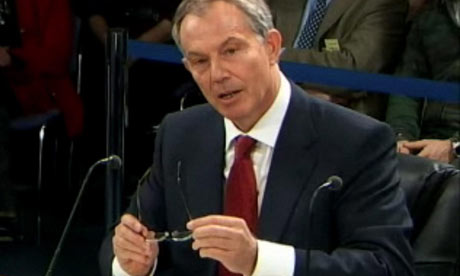
Iraq inquiry to recall Tony Blair over possible conflicting evidence
# Richard Norton-Taylor and Patrick Wintour
The Chilcot inquiry into the Iraq war is to summon Tony Blair back to give evidence and he will be asked to testify in both public and private, officials saidlast night.
The former prime minister, who gave nearly six hours of evidence on Friday, is expected to be asked about intelligence reports. His second public appearance could take place before the general election.

Tony Blair being questioned in public for the first time about his decision to take the UK to war against Iraq in London. Photograph: EPA
The panel are concerned in particular about his evidence relating to the legality of the invasion, the Guardian has learned. Blair's evidence seemingly contradicted that given by Lord Goldsmith, the attorney general at the time, about the number of discussions the pair had about issues of law between 7 March and 17 March 2003, three days before the attack on Iraq.
Blair also told the inquiry that the question of whether military action would be lawful was "always a very, very difficult, balanced judgment". Yet the panel has heard he told Lord Boyce, then chief of the defence staff, that it was his "unequivocal" view that an invasion would be lawful.
Blair told Goldsmith to pass on the message after Boyce demanded a yes or no answer to whether it would be legal. Boyce had been concerned about Goldsmith's view that only "a reasonable case" could be made in favour of an invasion.
Jack Straw, foreign secretary at the time, will be questioned next week about his view on the lawfulness of an invasion.
Clare Short, then international development secretary, yesterday claimed Blair marginalised her and Gordon Brown in the runup to the war, a view she is expected to repeat when she gives evidence to the inquiry tomorrow. She will face questions about whether she instructed her officials not to co-operate with the occupation, and to detail the legal restraints on her staff due to the lack of clear UN endorsement for military action. Short will also be expected to explain why so few of her staff were apparently available or willing to help in the reconstruction of Basra.
She told the BBC's Andrew Marr Show: "In most of the runup to the war Gordon and Tony were in one of their fallen-out phases and Gordon was marginalised, not included and not in the inner group.
"He was saying to me, 'They think they're going to have a quick and successful war and then they'll be very powerful and they'll have a reshuffle.'"
Short added: "He thought they wanted him out of the Treasury, because there was tension about how you spend the money of the government, and they were going to offer him the Foreign Office and he was saying, 'I won't accept it. I'll go and join you on the backbenches'."
She claimed that John Prescott, then deputy prime minister, reconciled Brown and Blair, leading Brown to back the war at the last moment on the basis that the French had vetoed a second UN resolution that would have endorsed the war.
Short, who resigned shortly after the war started, also condemned the key thesis put forward by Blair to the inquiry.
"His great big argument that, after 11 September and the attack on the twin towers, there was a danger that rogue states would give weapons of mass destructions to organisations like al-Qaida, and that's the reason for going to Iraq – he never argued at the time.
"And it is ludicrous. There was no link of any kind ... between Saddam Hussein and al-Qaida. So there was no such threat."
www.guardian.co.uk/uk/2010/feb/01/chilcot-inquiry-recalls-tony-blair
